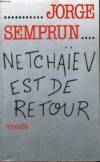Auteurs contemporains
Discours critique sur les œuvres de littérature contemporaine
Outils pour utilisateurs
Outils du site
Ceci est une ancienne révision du document !
Netchaïev est de retour
Jorge Semprún - Paris, Éditions Jean-Claude Lattès, 1987, 330 p.
Documentation critique
AGUADO, Joseph, « Articulaciones políticas en la narrativa española de los años 80 y 90 : Hacia un modelo de subjetividad », thèse de doctorat, Department of Romance Languages and Literatures, University of North Carolina at Chapel Hill, 2000, 288 f. +++ Thèse de doctorat / mémoire de maîtrise
### Abstract
In my study, the texts by Manuel Vázquez Montalbán, Juan Goytisolo, Rosa Montero and Jorge Semprún share a dissatisfaction with the sociopolitical present of Spanish society. This uneasiness emerged in the late 1980s and early 1990s, a period when the fall of the Berlín wall and the exhaustion of social reformist policies in Europe together with the end of the transition to democracy period in Spain gave the impression of living in the best of all possible worlds. In Spain, this was partly due to the depolitization of the social realm, a direct outcome of a transition to democracy taking place within a postmodemist paradigm that facilitated a strategic silencing of the Francoist past. For these authors, the literary enterprise requires a recuperation o f these silences so as to conceive new projects of citizenry for the future. The texts oscillate between what I call negotiation and denegotiation or attitudes of acceptance and rejection of the modernist/postmodernist paradigms. A number of writers reformulate the Enlightenment project (Montalbán and Semprún), others find refiige in cultural hybridity (Goytisolo), while others deal with subjectivity in order to fragment and decenter the subject through gender (Montero), or a rearticulation of the dichotomy and hierarchy between local and universal values.
My project analyzes the ways in which the epistemological tensions between what has been termed an unfinished modernity in Spain and an overwhelmingly predominant postmodern framework imply a rethinking o f the roles o f history and memory in the production of literary texts. Within this paradigm, memory becomes the tool the authors in my study use in order to engage in a revisionary dialogue with Spain’s immediate past, for the practice of remembrance enables them to analyze the sociohistorical configurations of the present as one possibility of history among others. In their work, postmodemity’s amnesic qualities, its effacement of temporality, and its curtailing the possibilities of a future outside of the parameters of the present come under question.
La version PDF de la thèse est disponible pour les membres de communautés universitaires qui ont un abonnement institutionnel auprès de UMI - Proquest. ###
BRÉMARD, Bénédicte, « Netchaïev est de retour : éloge de la démocratie ou tragédie de sa corruption? », CinémAction, no 140 (2011), p. 146-151. +++ Article de revue
@@Description@@
CÉSPEDES GALLEGO, Jaime, « Netchaiev ha vuelto (1987) », La obra de Jorge Semprún : Claves de interpretación. Vol. 1 : Autobiografía y novela, Berne, Peter Lang (Perspectivas hispánicas), 2012, p. 181-188. +++ Monographie
@@Description@@
| Netchaïev est de retour (oeuvre) | |
|---|---|
| Titre | Netchaïev est de retour |
| Auteur | Jorge Semprún |
| Parution | 1987 |
| Tri | Netchaïev est de retour |
| Afficher | oui |
